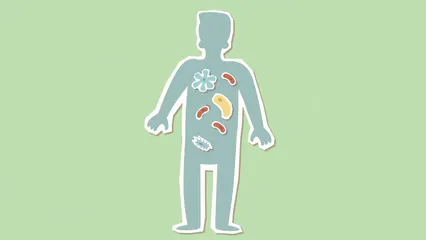
Why Do My Teeth Hurt When I Have a Cold?
Introduction
Have you ever caught a cold and noticed tooth pain? You’re not alone! Many people experience dental discomfort during cold season. This article will explore the reasons behind this pain and suggest ways to find relief.
Summary and Overview
Colds can lead to unexpected dental discomfort, causing frustration amid other symptoms. When colds hit, your body reacts with inflammation and mucus production. This can lead to sinus pressure, which directly affects your teeth. Dehydration also plays a role, as it decreases saliva, essential for oral health. It’s crucial to maintain good oral hygiene during illness to prevent further complications. We’ll discuss effective remedies for managing this tooth pain and how to keep your mouth healthy while feeling under the weather.
To help you along the way, consider using a Warm Salt Water Rinse Kit. Rinsing with warm salt water can soothe irritated gums and reduce inflammation, providing relief while you battle that pesky cold.

Causes of Tooth Pain During a Cold
Sinus Pressure
Sinus pressure is a common culprit for tooth pain during a cold. When you catch a cold, your sinuses become inflamed, leading to excess mucus. This inflammation can press against the roots of your upper teeth, causing discomfort. Your maxillary sinuses sit just above your upper molars, making them particularly vulnerable to pressure changes. Symptoms like a dull ache or sensitivity in your upper teeth may feel like dental pain, but they often stem from sinus irritation instead. Interestingly, about 30% of people experience sinus issues during a cold, highlighting the connection between sinusitis and dental discomfort. Recognizing this can help you identify the source of your pain and seek appropriate relief.
Changes in Blood Flow
When fighting a cold, your body boosts blood circulation to bolster your immune response. This increase in blood flow can heighten sensitivity in dental tissues, resulting in discomfort. The inflammation caused by your immune system’s reaction can amplify any existing dental issues, making your teeth feel more sensitive. If you have cavities or gum problems, the impact can be even more pronounced. Research shows that nearly 40% of individuals report increased tooth sensitivity during illness. Being aware of this connection can help you manage your discomfort better and understand the importance of addressing dental health prior to cold season.

Dehydration
When you have a cold, dehydration often sneaks up on you. Symptoms like fever and increased mucus can sap your body’s fluids. This lack of hydration can seriously impact your oral health. Saliva plays a crucial role in keeping your mouth healthy. It washes away bacteria and neutralizes acids. However, during a cold, saliva production tends to drop significantly. This condition, known as xerostomia, leads to a dry mouth. A dry mouth not only feels uncomfortable but also increases the risk of tooth decay and gum disease. Research indicates that nearly 50% of people experience dehydration when battling a cold. Drinking water is vital to combat this effect. Staying hydrated helps maintain saliva flow, which protects your teeth and gums. Remember, a well-hydrated body supports overall oral hygiene, especially during cold season.
Speaking of hydration, consider keeping a Water Bottle with Time Markers handy. It’s a fantastic way to remind yourself to drink water throughout the day, keeping you hydrated and your mouth happy!

Understanding the risks of dehydration during a cold can help you take better care of your oral health. why no ibuprofen after tooth extraction
Ear Infections
Ear infections often tag along with colds, and they can lead to unexpected tooth pain. The anatomical connection between your ears and teeth is quite fascinating. When you experience congestion from a cold, it can lead to fluid buildup in the middle ear. This condition, known as otitis media, can create pressure that radiates pain to your jaw and teeth. Many people report sharp tooth pain that coincides with ear discomfort. This referred pain can confuse the source of your discomfort. Statistics show that about 15% of individuals with colds will develop ear infections. If you notice symptoms like ear pressure or hearing difficulties alongside tooth pain, it’s time to consult a healthcare professional. Identifying the root cause can help you find effective relief.

Relief for Tooth Pain During a Cold
Home Remedies
Experiencing tooth pain during a cold can be quite uncomfortable. Thankfully, several home remedies may offer relief. First, consider rinsing your mouth with warm salt water. This simple solution can soothe irritated gums and reduce inflammation. Additionally, steam inhalation can help clear your sinuses and alleviate pressure. Remember to maintain gentle oral hygiene practices. Use a soft-bristled toothbrush to avoid further irritation. If you’re experiencing sensitivity, opt for toothpaste for sensitive teeth. Staying hydrated is also crucial, as it helps maintain saliva flow. Lastly, consider sugar-free lozenges to stimulate saliva production. These small changes can significantly improve your comfort while you’re under the weather.

Over-the-Counter Pain Relievers
When a cold strikes, tooth pain can be quite bothersome. Fortunately, over-the-counter (OTC) pain relievers can help manage your discomfort. Common options include acetaminophen and ibuprofen. Both medications work as analgesics, reducing pain and inflammation effectively. It’s essential to follow the instructions on the label for proper dosing.

However, it’s wise to consult with your healthcare provider before taking any medication, especially if you have existing health conditions or are on other drugs. They can guide you on the best options for your specific situation. Remember that while OTC pain relievers can provide temporary relief, they won’t address the underlying cause of your tooth pain. If your discomfort persists, seeking professional advice is crucial for proper diagnosis and treatment.
Staying Hydrated
Staying hydrated is vital for your oral health, especially when you have a cold. Dehydration is common during illness due to fever and mucus loss, leading to dry mouth. Saliva is essential for washing away bacteria and maintaining a healthy mouth. Without enough saliva, your risk of tooth decay and gum disease increases.

To boost your fluid intake, aim to drink plenty of water throughout the day. Herbal teas and clear broths can also help. If you find plain water unappealing, try adding slices of lemon or cucumber for flavor. Additionally, eating water-rich fruits like watermelon or oranges can contribute to your hydration needs. Staying hydrated enhances your overall well-being and supports better oral hygiene during a cold.
When to See a Dentist
While tooth pain during a cold is often temporary, there are times when you should see a dentist. If you experience persistent pain that lasts beyond your cold, it might indicate an underlying dental issue. Conditions like cavities or gum disease can worsen when you’re ill, making prompt attention necessary.

Look out for signs such as swelling, fever, or pain that radiates to other areas. These could signal a dental emergency requiring immediate care. Remember, even if your cold symptoms improve, unresolved dental pain might need professional evaluation. Don’t hesitate to schedule an appointment for a thorough examination and peace of mind. Prioritizing your dental health ensures a quicker recovery from both your cold and any underlying issues.
Conclusion
In summary, cold symptoms often lead to tooth pain, particularly due to sinus pressure, dehydration, and inflammation. The discomfort you may feel in your teeth can be tied to the body’s response to the cold virus. It’s essential to maintain your oral hygiene and stay hydrated during this time. Drinking plenty of fluids can help alleviate dryness and support saliva production, keeping your mouth healthy. If your tooth pain persists even after your cold has cleared, it’s wise to seek professional advice. Don’t ignore ongoing discomfort; a dental check-up can help identify any underlying issues.

FAQs
Please let us know what you think about our content by leaving a comment down below!
Thank you for reading till here 🙂 And remember, if you’re feeling a bit under the weather, a good Herbal Tea Variety Pack can work wonders for your throat and soul!
All images from Pexels




